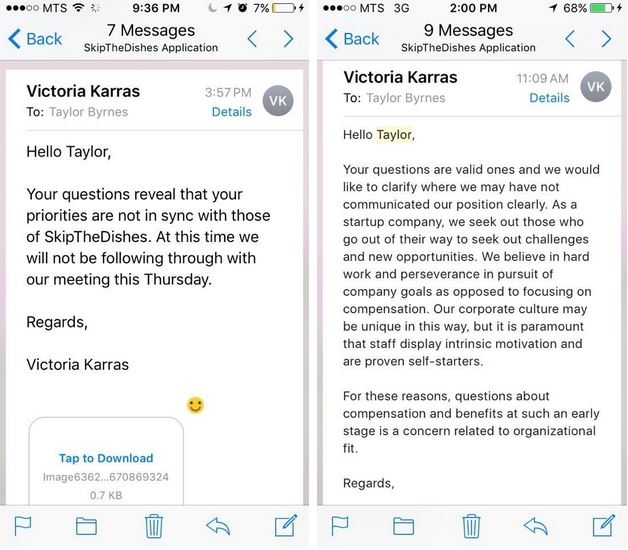Leggings Cause Trouble for United
Two teenage girls wearing leggings weren't allowed on a United Airlines flight. A passenger overheard the exchange, and you know the rest: cue the Twitter mob. Mentions of United went from an average of 2,000 to 174,000 (and no, it's still not true that "any publicity is good publicity"-in this case, 70% of the tweets were negative).
For some reason, celebrities got into the discussion too. Patricia Arquette, for example, tweeted, "@United. Leggings are business attire for 10 year olds [sic]. Their business is being children." (Isn't Arquette's business being an actress?)
What people didn't realize is that the girls were flying on free passes for family of United employees, and the company's policy includes a dress code for representatives of the airline. United explained the situation in a statement on its website.
Although American Airlines has a policy similar to United's, Delta asks passengers to use their "best judgment" when deciding what to wear. Delta took advantage of the situation with a sarcastic tweet.
Discussion:
- How well did United handle the situation? What points did the company emphasize in its statement?
- What's your view of Delta's tweet: clever, playful, schadenfroh (look it up), or something else?
Uber and Other Tech Companies' Diversity Stats
 After the scathing blog post about Uber's lack of diversity and issues with sexual harassment reporting, the company has published its diversity stats.
After the scathing blog post about Uber's lack of diversity and issues with sexual harassment reporting, the company has published its diversity stats.
Business Insider shows a series of bar charts comparing Uber's numbers to those of Facebook, Apple, Google, Twitter, and Microsoft. No companies are doing splendidly in terms of the percentage of women and people of color, but Uber is the least diverse in only one category: leadership. As the company reports, "Our leadership is more homogeneous than the rest of our employees. For example, no Black or Hispanic employees hold leadership positions in tech. This clearly has to change - a diversity of backgrounds and experience is important at every level."
 After additional criticism of CEO Travis Kalanick, he promises to take a more transparent approach: "This report is a first step in showing that diversity and inclusion is a priority at Uber. I know that we have been too slow in publishing our numbers - and that the best way to demonstrate our commitment to change is through transparency. And to make progress, it's important we measure what matters." Still, a Wall Street Journal article referred to Kalanick as "beleaguered": "Uber has said it is standing by its beleaguered founder." I wonder for how long that will continue.
After additional criticism of CEO Travis Kalanick, he promises to take a more transparent approach: "This report is a first step in showing that diversity and inclusion is a priority at Uber. I know that we have been too slow in publishing our numbers - and that the best way to demonstrate our commitment to change is through transparency. And to make progress, it's important we measure what matters." Still, a Wall Street Journal article referred to Kalanick as "beleaguered": "Uber has said it is standing by its beleaguered founder." I wonder for how long that will continue.
Discussion:
- Compare Uber to the other technology companies in Business Insider's charts. What conclusions do you draw?
- Compare Business Insider's bar charts to Uber's circle charts. Which work better and why? Why would each source choose the visual it did?
- How well does Uber explain its diversity position and goals on its website? What are the key messages you glean from this page?
Applicant Asks About Salary and Employer Cancels Interview

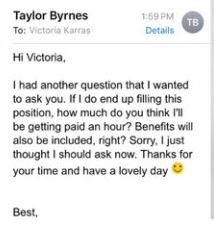 It was a tough lesson for Taylor Byrnes, looking for a menu developer position in Winnepeg. After a phone interview and before an in-person interview, she dared to ask her prospective employer, food delivery service SkipTheDishes, about wages and benefits. The company didn't appreciate the questions and cancelled the interview.
It was a tough lesson for Taylor Byrnes, looking for a menu developer position in Winnepeg. After a phone interview and before an in-person interview, she dared to ask her prospective employer, food delivery service SkipTheDishes, about wages and benefits. The company didn't appreciate the questions and cancelled the interview.
After the predictable outrage on Twitter, co-founder Joshua Simair said in a statement, "The email sent to Taylor was wrong and does not represent our team's approach or values," and "We are very disappointed in how it was handled. We do share a compensation package prior to hiring. As soon as we became aware of it on Monday, we reached out to Taylor to apologize for the email and reschedule her interview."
- Your thoughts? It typically is considered poor form to ask about salary on a first interview, but what about this situation? Did Byrnes behave badly? Did she make the situation worse with her posts on social media and therefore get what she deserved?
- How well did SkipTheDishes respond? Should they have done something else?
- Would you offer Byrnes the job if she's qualified? How easily can she and the HR staff get past this?
Sideways, Google's New Dictionary
 The Jigsaw incubator at Google Alphabet has created a dictionary to explain technical terms to the rest of us. Browser hijacking, cache, proxy, spoofing, tor-all are defined using simple analogies. Tor, for example, "Is like an onion. Tor stands for The Onion Router because it uses layer upon layer of protection to maximize anonymity. And trying to hack into it makes you cry."
The Jigsaw incubator at Google Alphabet has created a dictionary to explain technical terms to the rest of us. Browser hijacking, cache, proxy, spoofing, tor-all are defined using simple analogies. Tor, for example, "Is like an onion. Tor stands for The Onion Router because it uses layer upon layer of protection to maximize anonymity. And trying to hack into it makes you cry."
The site's About page explains, "It's like a dictionary, but using analogies instead of definitions. Use it as a tool for finding and sharing helpful analogies to explain technology. Because if everyone understands technology better, we can make technology work better for everyone."
The head of marketing for Jigsaw, Alfred Malmro, had the idea for Sideways when he was trying to explain the new division of Google: "I started comparing things. 'This tool is like an armored vehicle,' or ‘this one is like a seatbelt.' And suddenly they understand, well, I want to use the seatbelt but I'm not sure that I need an armored vehicle. It really needed real world comparison." Malmro also says, "It's about communicating safety as simply as possible to people."
Users can submit analogies. Moderators cull those that aren't accurate, but ultimately, users decide which are most useful to understanding.
Discussion:
- Read a few of the definitions. How helpful do you find the analogies?
- What are the potential dangers of this approach? Overall, do you like the idea?
Germany Proposes to Fine Companies for Illegal Content
 The German government wants to fine Google, Facebook, and other social media sites if they don't remove "hate speech, fake news and other undesirable content" within 24 hours if it's considered "blatantly illegal" and within seven days if it's otherwise considered to be breaking the law.
The German government wants to fine Google, Facebook, and other social media sites if they don't remove "hate speech, fake news and other undesirable content" within 24 hours if it's considered "blatantly illegal" and within seven days if it's otherwise considered to be breaking the law.
A Politico article describes the decision:
"Facebook and Twitter missed the chance to improve their takedown practices," said Heiko Maas, federal minister for justice and consumer protection. Maas claimed social media networks don't take complaints seriously. "For companies to take on their responsibility in question of deleting criminal content, we need legal regulations."
According to one study, Facebook removed 33% of illegal posts within 24 hours so far this year-not enough for some critics-and Twitter did worse, removing only 1% within 24 hours. The social media companies argue that policing negative activity is nearly impossible given the volume of posts on their sites.
In Twitter's defense (it needs one), the company has published extensive policies, including those related to "Hateful Conduct." But bullying, threats of violence, and other misconduct have been an issue for Twitter since the beginning and continue to plague the site's credibility.
In related hate-speech news, AT&T, Johnson & Johnson, and other big companies are pulling ads on YouTube because they don't want them appearing next to inappropriate content. This is another, perhaps more effective, way to get the social media sites to take action.
Discussion:
- What's your view of Germany's proposed law: reasonable, necessary, unrealistic, or something else?
- What effect do you think such a law would have on the social media sites? How about its users?
Another Million-Dollar Comma
 Or, in this case, a $10 million comma. Yes, it's another legal battle where meaning is questioned because of a comma-more precisely, a missing Oxford comma. Business communication students know it well: that last comma in a series your instructor encourages you to insert for clarity, even though most major newspapers don't use it, and your middle school teacher didn't make such a fuss about it.
Or, in this case, a $10 million comma. Yes, it's another legal battle where meaning is questioned because of a comma-more precisely, a missing Oxford comma. Business communication students know it well: that last comma in a series your instructor encourages you to insert for clarity, even though most major newspapers don't use it, and your middle school teacher didn't make such a fuss about it.
Truck drives for a dairy company, Maine-based Oakhurst Dairy, sued for $10 million in overtime pay because Maine's overtime statutes are unclear.
A Smithsonian news report summarizes the dispute related to F, "The canning, processing, freezing, drying, marketing, storing, packing for shipment or distribution of":
- Does this change your thinking about the Oxford comma, or do you still consider it a waste of time and space?
- What's your view of the court's ruling? Did the judge make the right decision? Why or why not?
Uber Loses President After Six Months
 Adding to Uber's trouble, President Jeff Jones resigned after only six months on the job, citing issues with the company. Reuters summarizes a statement submitted by Jones, who was previously the CMO for Target:
Adding to Uber's trouble, President Jeff Jones resigned after only six months on the job, citing issues with the company. Reuters summarizes a statement submitted by Jones, who was previously the CMO for Target:
"I joined Uber because of its mission, and the challenge to build global capabilities that would help the company mature and thrive long term," Jones said.
"It is now clear, however, that the beliefs and approach to leadership that have guided my career are inconsistent with what I saw and experienced at Uber, and I can no longer continue as president of the ride sharing business," he added. Jones wished the "thousands of amazing people at the company" well.
This is the sixth executive departure within the month. In an emailed statement, Uber wrote, "We want to thank Jeff for his six months at the company and wish him all the best."
This weekend, The New York Times Technology section reported that Bill Gurley, whose venture capital firm, Benchmark, owns 20% of Uber, is taking a more active role in the company. Gurley is known for warning start-ups about "excessive risk-taking." The Times also describes Gurley as "a rare figure, a Silicon Valley habitué who chides some of the biggest start-up stars to show some discipline and drop their arrogant behavior." It sounds like Uber will get some lessons in humility.
Discussion:
- Jones didn't have to say anything when he left. Why do you think he chose to handled the situation as he did? What were his other choices and the potential consequences?
- Uber's statement is short and sweet. Should the company have said something else?
- What does humility mean to you? Do you agree that Uber could use a dose?
Tillerson Had an Alias Email at Exxon
 New Secretary of State Rex Tillerson had an alias email address when he was CEO of Exxon and used it to discuss climate change issues. New York Attorney General Eric Schneiderman discovered the account-and 34 others-while investigating Tillerson on potentially misleading statements about climate change.
New Secretary of State Rex Tillerson had an alias email address when he was CEO of Exxon and used it to discuss climate change issues. New York Attorney General Eric Schneiderman discovered the account-and 34 others-while investigating Tillerson on potentially misleading statements about climate change.
Company spokesman Alan Jeffers says Tillerson did nothing wrong and set up the account because his primary email was overloaded:
"The email address, Wayne.Tracker@exxonmobil.com, is part of the company's email system and was put in place for secure and expedited communications between select senior company officials and the former chairman for a broad range of business-related topics."
"This was not an alias used to discuss only climate change. It was an account used for everyday business by senior executives who needed to reach."
Wayne is Tillerson's middle name, and Tracker may be relevant to his past involvement with the Boy Scouts of America.
Discussion:
- Do you believe Exxon's argument that nothing is wrong here? Why or why not?
- Should Exxon have disclosed the account during the lawsuit? They did reveal the email address but didn't connect it to Tillerson.
- If the company did create the account, and Tillerson used it for "confidential" conversations, why do you think Tillerson and Exxon thought they could get away with this: arrogance, niavety, desperation, or something else?
Monsanto Emails Reveal Company's Potential Influence over Cancer Studies
 A key ingredient, glyphosate, in weedkiller Roundup may cause cancer, and emails from Monsanto employees put the company's role in cancer research into question. According to a Dow Jones news report, "Emails among company employees, released this week as part of a continuing lawsuit over the herbicide, reflect what the plaintiffs' attorneys say was the company's inappropriate role in shaping research and a cozy relationship with regulators at the U.S. Environmental Protection Agency. Monsanto argued the emails were taken out of context."
A key ingredient, glyphosate, in weedkiller Roundup may cause cancer, and emails from Monsanto employees put the company's role in cancer research into question. According to a Dow Jones news report, "Emails among company employees, released this week as part of a continuing lawsuit over the herbicide, reflect what the plaintiffs' attorneys say was the company's inappropriate role in shaping research and a cozy relationship with regulators at the U.S. Environmental Protection Agency. Monsanto argued the emails were taken out of context."
An EPA toxicologist, who had cancer, concluded that "it is essentially certain that glyphosate causes cancer." She wrote an impassioned letter to EPA Deputy Division Director Jess Rowland in 2013 highlighting the negative effects of the chemical.
Perhaps the most damning evidence is a Monsanto email summarizing a phone conversation with Rowland, which implies that the EPA is trying "kill" evidence of glyphosate causing cancer:
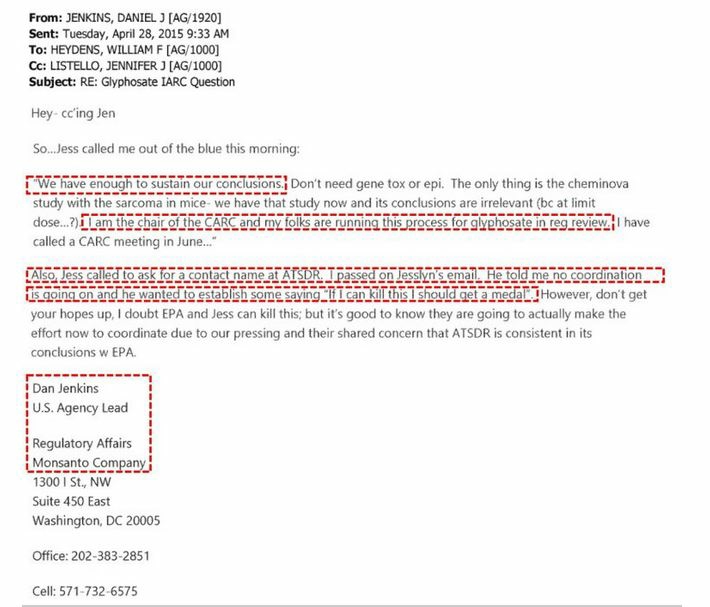
In addition, Monsanto's own lead toxicologist wrote in a 2009 email and confirmed in a recent deposition, "you cannot say that Roundup does not cause cancer … we have not done carcinogenicity studies with ‘Roundup.'"
Discussion:
- Once again, let's help companies avoid legal trouble with email. What should Monsanto have done differently?
- Of course, email isn't to blame, but the company and EPA may be. What went wrong here?
Disney Won't Cut the Gay Scene
 A gay scene in the new Disney "Beauty and the Beast" movie is causing a stir in other countries. The movie won't be shown in Malaysia because the company refuses to cut a three-second scene showing two male characters dancing together. A member of the censorship board said, "It is in our guidelines that we don't allow L.G.B.T. activity in movies in Malaysia. They are the ones not allowing the movie to be shown. We approved it with a minor cut."
A gay scene in the new Disney "Beauty and the Beast" movie is causing a stir in other countries. The movie won't be shown in Malaysia because the company refuses to cut a three-second scene showing two male characters dancing together. A member of the censorship board said, "It is in our guidelines that we don't allow L.G.B.T. activity in movies in Malaysia. They are the ones not allowing the movie to be shown. We approved it with a minor cut."
Director Bill Condon called the interaction "a nice, exclusively gay moment," and Disney made a short statement about the controversy: "The film has not been and will not be cut for Malaysia."
Officials in other countries aren't happy about the scene either. A Russian lawmaker said it was a "blatant, shameless propaganda of sin," and although the country will show the movie, only those 16 years or older can see it.
Condon said of the characters: "LeFou is somebody who on one day wants to be Gaston and on another day wants to kiss Gaston. He's confused about what he wants. It's somebody who's just realizing that he has these feelings."
Discussion:
- What do you think of Disney's choice to include two men dancing in a movie?
- Should Disney cut the scene so the movie would be shown in Malaysia? If it makes a difference in your answer (does it?), The New York Times reports, "'The Jungle Book' last year had $967 million in global ticket sales, and Malaysia represented $5.7 million of that total."
- How do you assess Disney's short statement in response? Should the company say more? Why or why not?
NYSEG Email and Reality
 NYSEG was preparing for the worst and trying to inspire customer confidence and stave off complaints. The NY gas and electric company sent email the day before the snow storm was expected to hit to tell us, "We're Prepared!"
NYSEG was preparing for the worst and trying to inspire customer confidence and stave off complaints. The NY gas and electric company sent email the day before the snow storm was expected to hit to tell us, "We're Prepared!"
Anticipating outages, NYSEG told us to contact "Outage Central" on its website. The main point of the email seems to be to tell customers how to report an outage-presumably to avoid a flood of phone calls that NYSEG can't handle.
Meanwhile, about 100,000 people are without power, and Twitter is abuzz with calls for NYSEG to do something other than "assess" the situation. Some are calling for an investigation into how NYSEG is handling outages.
@irenapapst tweeted, "... ithaca city schools were declared closed, and NYSEG sent out a pamphlet on storm preparedness. if other organizations were prepared ..."
Discussion:
- What's your view of NYSEG's pre-storm communications? Did this help or hurt the organization's reputation? What, if any, impact do you think the email and website had on storm outages?
- People are harsh towards NYSEG on Twitter. From what you observe, is it deserved? Could the organization do something different?
Children Crash a Professor's BBC Interview
 Professor Robert Kelly certainly didn't expect this type of fame. More than 15 million people have seen the professor of political science in a BBC interview interrupted by his children.
Professor Robert Kelly certainly didn't expect this type of fame. More than 15 million people have seen the professor of political science in a BBC interview interrupted by his children.
The video is hilarious and shows an embarrassed, yet quietly laughing Kelly as his two children come into his office, eventually rescued by his wife.
Of course, everyone seems to have an opinion on Kelly's parenting skills from this short encounter. Maybe Kelly was right to question BBC's posting of the video. When asked for permission to post it on Twitter, Kelly said, "What would that mean, please? Re-broadcasting it on BBC TV, or just here on Twitter? Is this kinda thing that goes ‘viral' and gets weird?"
According to The Telegraph, "The academic's mother, Ellen Kelly from Cleveland, Ohio, said the incident may have occurred after the children thought they were Skyping their grandparents."
Discussion:
- How did Kelly handle the interruption? Should he have done something different?
- Are people right to criticize his parenting skills? Why or why not?
- How did the BBC reporter respond? Also, should he have done something different?
- Kelly's Twitter page now has 21.5k followers, but he's not saying a word. Should he?
Signet CEO Responded to Criticism, But Is Silent Now
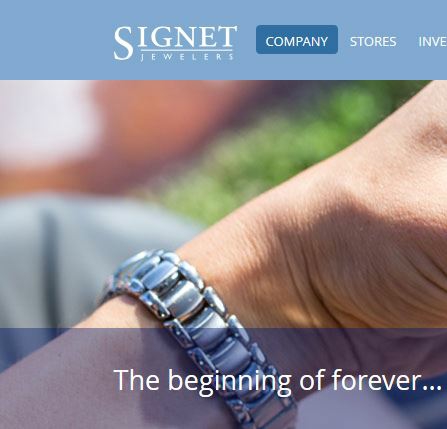 Signet Jewelers, the largest U.S. jewelry retailer and owner of Zales and Kay, is facing criticism from investors, employees, and customers. The stock fell 25% at the beginning of 2016-a notable decline in a rallying market.
Signet Jewelers, the largest U.S. jewelry retailer and owner of Zales and Kay, is facing criticism from investors, employees, and customers. The stock fell 25% at the beginning of 2016-a notable decline in a rallying market.
Complaints about missing and swapped jewels and sexual harassment of employees are the latest to cause trouble for the company. But CEO Mark Light disputes these claims in an interview with CNBC.
He defends the company by saying, "We are all about trust." Reporters asked Light about customer credit and the "unusual amount of financing," which raises the question of what happens if customers default on their loans. To counter these concerns, Signet points to the company's 30-year history and their knowledge of customers. Light sees financing as a competitive advantage and says they are happy with their credit book.
Light does talk about continuous improvement and says they will "look at protocols going forward," but he also says, "We don't believe we have a serious problem."
This quarter, Signet earnings are up, but the controversy remains. The Motley Food reports, "CEO Mark Light continues to maintain his silence."
Discussion:
- What's your view of the situation? Is criticism about the company too harsh, is Mark Light in the dark, or what?
- How well goes Light address concerns about the company in this interview? What could he do differently to rebuild the brand? What should he do now?
Cancer Research Scientist Faces Credibility Questions
What The New York Times calls "years of ethics charges" have plagued a cancer researcher, but new problems may be his final undoing. Dr. Carlo Croce, at Ohio State University, has brought in $86 million in federal grants, but the Times reports, "he overstated his expansive claims for the therapeutic promise of his work, and that his laboratory is focused more on churning out papers than on carefully assessing its experimental data."
David A. Sanders, a virologist at Purdue University, has called out more than 20 of Croce's papers claiming falsified data: "It's a reckless disregard for the truth."
In a nifty, interactive visual, The New York Times shows how Croce's work was manipulated in one journal article. If you look closely, you see that a bright line is disjointed, warning that some copying and pasting took place. Indeed, samples 6, 7, and 8 are identical to 3, 4, and 5.
Also questionable is Croce's work as an advisor to the Council for Tobacco Research. Although Croce says he believes smoking causes lung cancer, the Council has used his work to prove otherwise.
One of the biggest questions is the role of Ohio State University: did the administration dismiss charges that should have been more seriously considered? The University responded to the article in a short opinion letter, concluding, "While the review is still underway, the independent experts have found that our policies meet with national research compliance standards. They have also found no evidence that Ohio State deviated from those policies in reviewing allegations of research misconduct."
Discussion:
- Read the NYT article. What do you believe are the most egregious claims against Croce?
- Look online for other examples of image manipulation in scientific journals. Should peer-review journals be more vigilant in catching these falsifications? Or are they too difficult to judge?
- Analyze the University's opinion letter. Which parts do you find most and least convincing?
Trump Team Typos
 The Trump Administration faced criticism this week because of typographical and spelling errors. A Politico article sums up the trouble:
The Trump Administration faced criticism this week because of typographical and spelling errors. A Politico article sums up the trouble:
Whether it is a wrong name (for an acting deputy attorney general or the prime minister of the United Kingdom), or a failure to distinguish your principles from your principals, the Trump administration's struggles with proofreading are profuse. The Department of Education misspelled the name of the co-founder of the NAACP. Then it compounded the error by making another error in a follow-up tweet.
Perhaps the most visible-and most recent-has drawn attention to the others:
Politico reminds us of another misspelling on the president's first day in office. He didn't learn the session from a tweet in February 2016 with the same mistake.

Discussion:
- What's your view of these errors: not a big deal, a chance for the press to pile on Trump, sloppy, irresponsible, or something else?
- The president clearly values direct, immediate communication. Are typos just an inevitable, sufferable consequence?
Medium's Layoff and Strategy Post
 Medium CEO Evan Williams, also co-founder of Twitter, posted news about the blogging site's new direction, including 50 layoffs. His blog post is a good example of communicating bad news in a respectful, sensitive way.
Medium CEO Evan Williams, also co-founder of Twitter, posted news about the blogging site's new direction, including 50 layoffs. His blog post is a good example of communicating bad news in a respectful, sensitive way.
In this post, Williams takes responsibility for past decisions that haven't panned out: 
Our vision, when we started in 2012, was ambitious: To build a platform that defined a new model for media on the internet. The problem, as we saw it, was that the incentives driving the creation and spread of content were not serving the people consuming it or creating it - or society as a whole. As I wrote at the time, "The current system causes increasing amounts of misinformation…and pressure to put out more content more cheaply - depth, originality, or quality be damned. It's unsustainable and unsatisfying for producers and consumers alike….We need a new model."
He also used plenty of emotional language to refer to people (e.g., "Obviously, this is a tough thing to do, made tougher by the immense respect and love we have for these people who have helped make Medium what it is today") and to refer to the business (e.g., "broken system").
Fortune reviews Williams' plan to change the business model, particularly focusing more on serving people, but the author is skeptical: "It is unclear how the company will approach the new goal."
Discussion:
- What examples of emotional language do you identify in Williams' post?
- How do you think employees reacted to the message? Consider employees both leaving and staying.
- He's quite open about the decision and plans for the business considering this is a public blog post. Why would he take this approach?
Supporting a Claim with Evidence
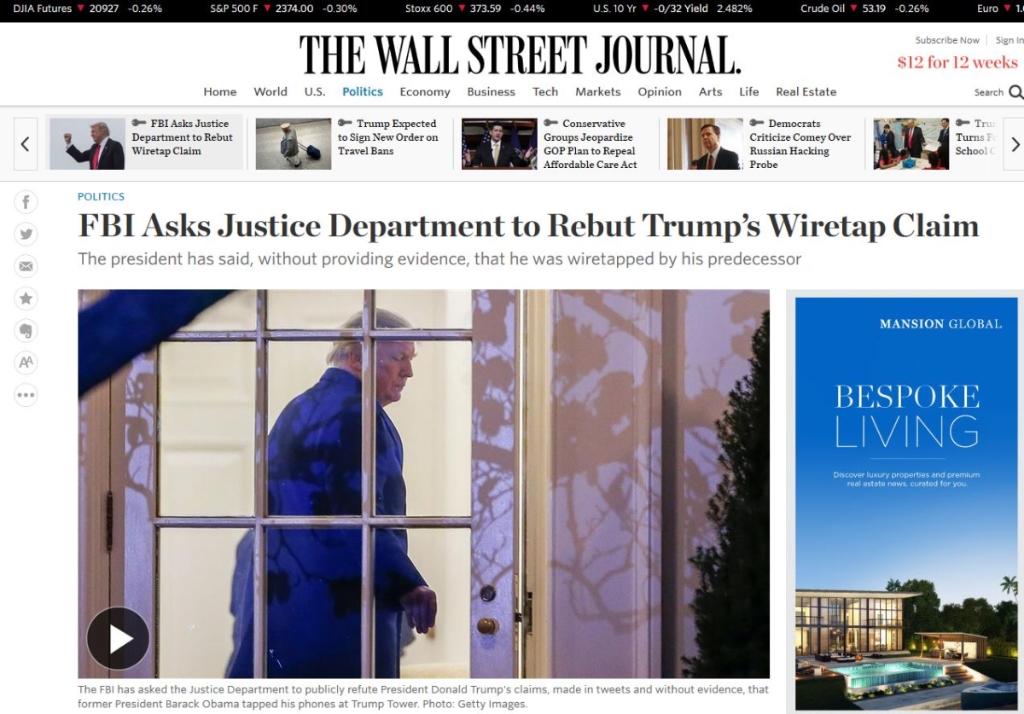 Business Communication students learn the importance of supporting claims with evidence in order to persuade an audience. President Trump's claim that former President Obama wiretapped his phone is being questioned by many reporters and the FBI.
Business Communication students learn the importance of supporting claims with evidence in order to persuade an audience. President Trump's claim that former President Obama wiretapped his phone is being questioned by many reporters and the FBI. 
FBI Director James Comey, in the news most recently for identifying more of Hillary Clinton's emails days before the election, seemingly without evidence, has asked the Justice Department to rebut the President's claims and to deny an investigation. This is an extraordinary request because, as The New York Times reports, this action "would be a major rebuke of a sitting president."
The Times also traces the claim, which started on a conservative radio show:
It began at 6 p.m. Thursday as a conspiratorial rant on conservative talk radio: President Barack Obama had used the "instrumentalities of the federal government" to wiretap the Republican seeking to succeed him. This "is the big scandal," Mark Levin, the host, told his listeners.
That was enough for President Trump to tweet his disgust.
I sometimes compare headlines in The New York Times and The Wall Street Journal. Today, they are both running this story as front page news, and even the more conservative WSJ says President Trump made this claim without evidence. The subtitle reads, "The president has said, without providing evidence, that he was wiretapped by his predecessor."
Discussion:
- What's your view of the president's response? Is it hasty, or did he have enough to go on?
- What should the Justice Department do with the president's request and James Comey's recommendation?
- What's the danger of the president's accusation? What if he's wrong? On the other hand, what's the danger of ignoring the potential violation? What if he's right?
Snap in Charts
Eric Spiegel, the founder of Snap Inc., is celebrating after a successful IPO that brought in $25 per share, a market value of $33 billion, and enough to bring his net worth to $6 billion, making him wealthier than Richard Branson, Donald Trump, and Oprah.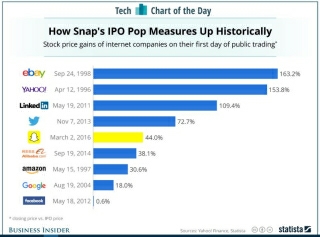
It's not the largest IPO, but the numbers are surprising, given that Snapchat is essentially an app, and 98% of its revenue comes from advertising. MarketWatch also reports losses:
Snap recorded $404.5 million in revenue in 2016, compared with $58.7 million in 2015. Net losses grew to $514.6 million in 2016, compared with a net loss of $372.9 million in 2015. Like many burgeoning tech startups, Snap warned that it "may never achieve or maintain profitability."
Still, the ad revenue is solid because of Snapchat's popularity with teens. As the second chart shows, Snapchat is highly popular and has seen a lot of growth between 2015 and 2016. 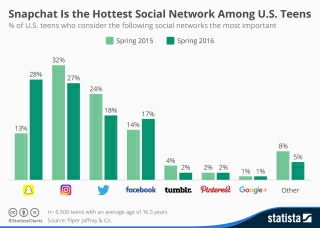
IPO image source and teen use image source.
Discussion:
- What principles for chart design from Chapter 9 are demonstrated in these two examples?
- What would you change about these charts to make them more effective?
- What 2017 data can you find about Snapchat? Create a new comparison chart.
Analyzing Trump's Tone in Speeches
How would you describe Trump's tone in his speeches? A New York Times article explains how sentiment analysis was used to compare his speeches over time and to other State of the Union addresses:
"That's according to a sentiment analysis of past speeches, which categorizes words according to several dimensions. Mr. Trump's campaign speeches used a high proportion of words associated with "anger" - like fight, illegal or bad - and a relatively low proportion of words with positive associations - like build, freedom or peace."

Sentiment analysis aside, his tone changes are pretty obvious. The best way I can describe his State of the Union address is "measured." He also gestured less and read more from the teleprompter-perhaps acting more presidential than we have seen him in less formal settings.
The Washington Post compiled the address "in 3 minutes." Of course, the compilation and the "winners and losers" identified by the author/editor are based on his own thinking about Trump/s plans and communications.
Discussion:
- How would you describe President Trump's tone in his State of the Union address? What, if anything, surprised you about the speech?
- The president certainly is adjusting to the audience and purpose of his speeches. Compare audiences for his campaign speeches and his official speeches as president. What are his objectives for each?
- With which of The Washington Post's conclusions do you agree and disagree? The author also refers to the speech as "strong." What do you think he means by this, and do you agree or disagree?
Uber CEO on Video
Uber CEO Travis Kalanick has apologized for his interaction with a driver that was video recorded. At the end of the trip, the driver, Fawzi Kamel, complained about Uber's lower prices. Kalanick explains that they have more competition, but the conversation got heated.
Kamel said, "People are not trusting you any more. . . . I lost $97,000 because of you. I'm bankrupt because of you. Yes, yes, yes, you keep changing every day."
Kalanick said, "Some people don't like to take responsibility for their own sh**," he said. "They blame everything in their life on somebody else. Good luck!" He also rated the driver with one star in the Uber app.
 A Guardian article explains the problem and quotes the executive director of the New York Taxi Workers Alliance:
A Guardian article explains the problem and quotes the executive director of the New York Taxi Workers Alliance:
Drivers for Uber Black, such as Kamel, face particular struggles because they are required to drive recent models of select premium vehicles. Drivers earn a higher rate, but they are increasingly competing with Uber's cheaper UberX rides.
Bhairavi Desai, the executive director of the New York Taxi Workers Alliance, called Kalanick's interaction with Kamel "heartless" and "appalling."
"Fawzi Kamel's plight is far from unique," she said. "We've talked to so many drivers who have been left in insurmountable debt after purchasing or leasing vehicles based on promised income from Uber then unable to make the payments as Uber has slashed fares, increased its commission, and flooded the streets with too many vehicles."
In uncharacteristic fashion for Uber, Kalanick apologized.
Discussion:
- What is Kamel's role in this situation? Did he behave 100% honorably?
- How could Kalanick have avoided the situation?
- What do you make of Kalanick's apology?






